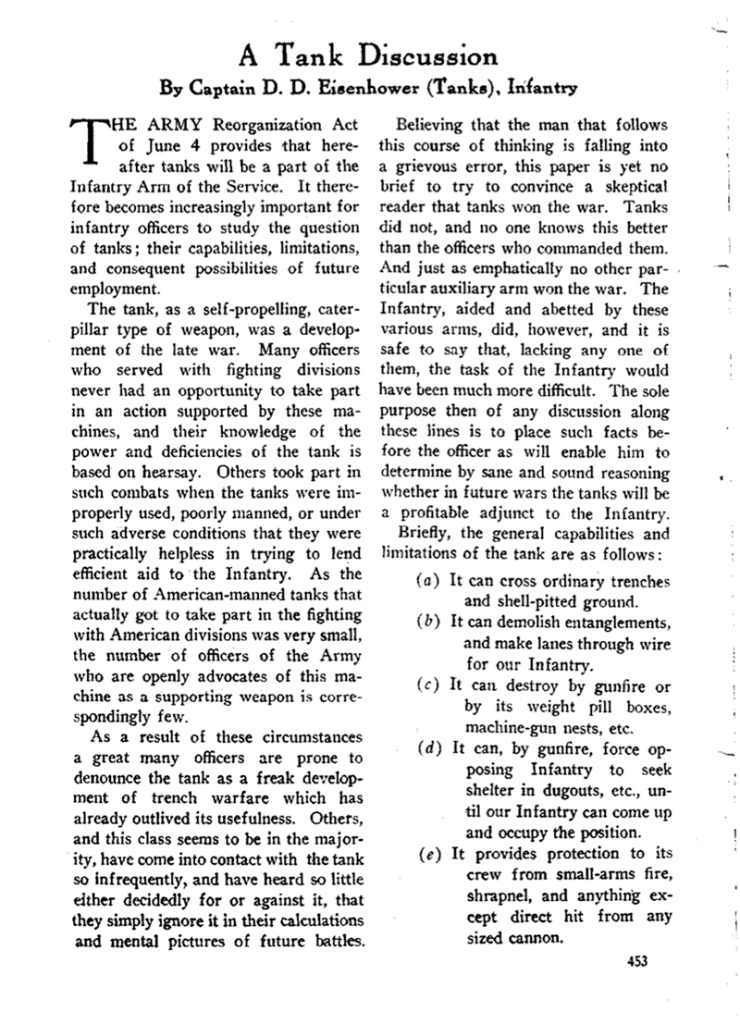In 1920, the then CPT Dwight Eisenhower wrote an article, titled “Tank Discussion”, for the United States Infantry Association’s Infantry Journal championing the integration of motorization (particularly tanks) into combat arms maneuver. As a member of the minority, his faith in the potential of motorization and the tank resulted in intense scrutiny from the Infantry establishment, which almost ended his career early. Undoubtedly, the tank later proved critical to the Army’s success in WWII.
The Strategic Initiatives Group at the Army Cyber Institute conducted a short experiment with the first three paragraphs of “A Tank Discussion”. We replaced occurence of “tank” with “cyber” and updated some language to modern terminology and context. The result is a remarkably relevant commentary given the current tensions in Army during the growth of the Cyber branch.
For your consideration is ACI SIG’s “A Cyber Discussion” and CPT Eisenhower “A Tank Discussion”:
Written by: The Army Cyber Institute’s Strategic Initiatives Group with special appearance from the Ghost of CPT Dwight D. Eisenhower

The establishment of the Cyber Branch in September 2014 by Army Secretary John McHugh and Army Chief of Staff General Odierno provided that here-after Cyber will be part of the Army service component. It therefore becomes increasingly important for combat arms officers to study the question of Cyber; its capabilities, limitations, and consequent possibilities of future employment.
Cyber, as a type of weapon, was a development in the late wars. Many officers who served with the fighting Brigade Combat Teams (BCT) never had an opportunity to take in an action supported by Cyber, and their knowledge of the power and deficiencies of Cyber is based on hearsay. Others took part in such combats when Cyber was improperly used, poorly manned, or under such adverse conditions that Cyber was practically helpless in trying to lend efficient aid to combat arms. As the number of Cyber teams that actually got to take part in the fighting with BCTs was very small, the number of officers of the Army who are openly advocates of this capability as a supporting weapon is correspondingly few.
As a result of these circumstances a great many officers are prone to denounce Cyber as a freak development of the recent war which has already outlived its usefulness. Others, and this class seems to be in the majority, have come into contact with Cyber so infrequently, and have heard so little either decidedly for or against it, that they simply ignore it in their calculation and mental pictures of future battles. Believing that the man that follows this course of thinking is falling into a grievous error, this paper is yet no brief to try to convince a skeptical reader that Cyber won the war. Cyber did not, and no one knows this better than the officers who commanded Cyber elements. And just as emphatically no other particular auxiliary arm won the war. The Infantry, aided and abetted by this various arms, did, however, it is safe to say that, lacking any one of them, the task of the Infantry would have been much more difficult. The sole purpose then of any discussion along these lines is to place such facts before the officer as will enable him to determine by sane and sound reasoning whether in future wars that Cyber will be a profitable adjunct to the infantry.